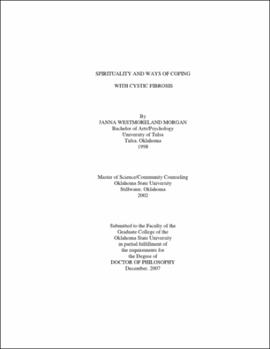| dc.contributor.advisor | Romans, John S. C. | |
| dc.contributor.author | Morgan, Janna Westmoreland | |
| dc.date.accessioned | 2013-11-26T08:34:44Z | |
| dc.date.available | 2013-11-26T08:34:44Z | |
| dc.date.issued | 2007-12 | |
| dc.identifier.uri | https://hdl.handle.net/11244/7510 | |
| dc.description.abstract | Scope and Method of Study: The daily lives of adults with chronic illnesses such as cystic fibrosis (CF) are influenced by psychosocial as well as physical factors. CF is a genetic, multi-system disease characterized by chronic airway obstruction, subsequent infection of the bronchial airways, and maldigestion because of pancreatic dysfunction (Anderson, 2001). With no cure at present, the current median age of survival is 35.5 years (Kepron, 2003). The primary purpose of this study was to examine the relationship between spirituality and four ways of coping (optimistic acceptance, hopefulness, distraction, and avoidance) as measured by the Spiritual Involvement and Beliefs Scale-Revised (Hatch, Burg, Naberhaus, & Hellmich, 2001) and the Ways of Coping with Cystic Fibrosis (Abbott, Dodd, Gee, & Webb, 2001) scale. In addition, the following demographic factors were examined to gain a further understanding of the nature of their relationship with coping: spiritual/religious affiliation status, disease severity, lung transplant list status, and frequency of discussing spiritual issues with one's CF physician. A multiple regression analysis strategy was utilized to gain insight into the way spirituality and the above cited demographic factors are related to the four ways of coping. | |
| dc.description.abstract | Findings and Conclusions: A total of 100 surveys were given to two Midwestern CF clinics to be distributed to adults with CF. There was a survey return rate of 56%. The SIBS-R and the Ways of Coping with CF scale was first examined for reliability and internal consistency, resulting in three items being deleted from the SIBS-R and two items being deleted from the WCCF scale due to low item to scale correlations. Multiple regression analysis was then conducted to answer each of the research questions. Optimistic acceptance and hopefulness coping emerged as significant positive predictors of spirituality. Hopefulness and avoidance coping were significant positive predictors of spiritual/religious affiliation status. Optimistic acceptance coping was a significant positive predictor of lung transplant list status. Hopefulness and avoidance coping emerged as positive predictors of frequency of discussing spiritual issues with one's CF physician. | |
| dc.format | application/pdf | |
| dc.language | en_US | |
| dc.rights | Copyright is held by the author who has granted the Oklahoma State University Library the non-exclusive right to share this material in its institutional repository. Contact Digital Library Services at lib-dls@okstate.edu or 405-744-9161 for the permission policy on the use, reproduction or distribution of this material. | |
| dc.title | Spirituality and ways of coping with cystic fibrosis | |
| dc.contributor.committeeMember | Boswell, Don | |
| dc.contributor.committeeMember | Barnes, Laura | |
| dc.contributor.committeeMember | Harrist, Steve | |
| osu.filename | Morgan_okstate_0664D_2539 | |
| osu.accesstype | Open Access | |
| dc.type.genre | Dissertation | |
| dc.type.material | Text | |
| dc.subject.keywords | spirituality | |
| dc.subject.keywords | cystic fibrosis | |
| dc.subject.keywords | coping | |
| dc.subject.keywords | health | |
| dc.subject.keywords | well being | |
| dc.subject.keywords | biopsychosocial | |
| thesis.degree.discipline | Educational Psychology | |
| thesis.degree.grantor | Oklahoma State University | |
